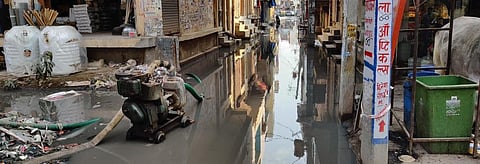Resource literacy of the poor
Just two months have passed in 2020, but scientists have already given a verdict that this year would be among the 10 warmest years on record. January was the warmest in 141 years, according to the National Oceanic and Atmospheric Administration.
Every year, we are told, is the hottest year, till the next year comes around. Then a new record is broken. It is getting worse — from forest fires to increasing frequency and intensity of storms and blistering cold waves and spiralling heat.
Climate change, it would seem, could not happen at a worse time in human history. It is clear that things are now spiralling out of control. The farmers, pastoralists and all the others who work the land, use the water and make a livelihood, are the worst affected. They are the victims of climate change.
The poor in the world have not contributed to the making of the problem. But let’s be clear, their pain will make our world more insecure. And this is only going to get worse. This is why we need to act and act now.
Each of these not so natural calamities takes away the development dividend that governments work so hard to secure. Houses and other personal belongings are washed away; roads and infrastructure destroyed and then all this has to be rebuilt. It is also clear that the flood or the drought is not just about climate change or changing weather patterns.
The fact is drought is about the mismanagement of water resources; where not enough rain is being recharged or water is used inefficiently and inequitably. Flood is about the sheer inability to plan for drainage; for our lack of concern to protect the forests on watersheds or the near criminal act of building and destroying the flood plains.
The weird weather comes on top of the already mismanaged land and impoverished polity. It is like that proverbial last straw on the camel’s back.
I call this, the double-whammy. High temperatures are only adding to the already heat and water stressed lands. Lack of green cover, increases desertification conditions; over-withdrawal of groundwater and poor irrigation practices degrades land. Then there is the over-intensification of land, largely because of the way we are doing agriculture — what we are eating. And how we are growing, indeed manufacturing what we eat.
The Intergovernmental Panel on Climate Change report on climate change and land rightly indicts modern agricultural practices for being over-chemicalised and over-industrialised and so adding to greenhouse gas emissions. The report has also called for changes in diets, which will make us tread lightly on earth. Our food and our climate change footprint is now connected.
It is also clear that increasing numbers of disasters will make the poor poorer. Their impoverishment and marginalisation will add to their desperation to move away from their lands and to seek alternative livelihoods. Their only choice will be to migrate — move to the city; move to another country.
The double-jeopardy in the interconnected world is the push — due to lack of option — to the pull bright lights that suggest a choice to better futures. Our globalised world is interconnected and inter-dependent. It is something we must recognise.
This is where the opportunity exists. If we can improve our management of land and water, we can shave off the worst impacts of climate change. We can build wealth for the poorest and improve livelihoods.
And, by doing this, we mitigate greenhouse gases, as growing trees sequester carbon dioxide; improving soil health captures carbon dioxide and most importantly, changes practices of agriculture and diets reduces emissions of greenhouse gases.
This is where the real answer is. So, we have to invest in the economies of the poor; we have to build their capacities so that they can, not just withstand the next calamity, but indeed overcome the calamity.
For this, we must invest in creating ecological assets — from rainwater harvesting to better food systems that are resilient. We must also redefine what we mean by resilience — often high-input agricultural systems are productive, but less resilient.
Farmers are more vulnerable to shocks when their debts are high. We need, therefore, to understand the strength of small-holder agricultural systems that are multi-crop, low-input and built for shocks. We must strengthen those and not replace them with ours. The knowledge of the poor is not poor. They are illiterate but very resource literate. Our effort must be to learn and to give.
But at the end, I would like to say with absolute conviction that the poor or the rich cannot “adapt” to increasing temperatures — the scale of the devastation will be enormous and catastrophic. So, even as we build and invest in businesses with a difference, we must take stronger action to curtail greenhouse gas emissions.
As yet the world is doing too little, too late. This must change. For all our sakes.
This was first published in Down To Earth's print edition (dated 1-15 March, 2020)


